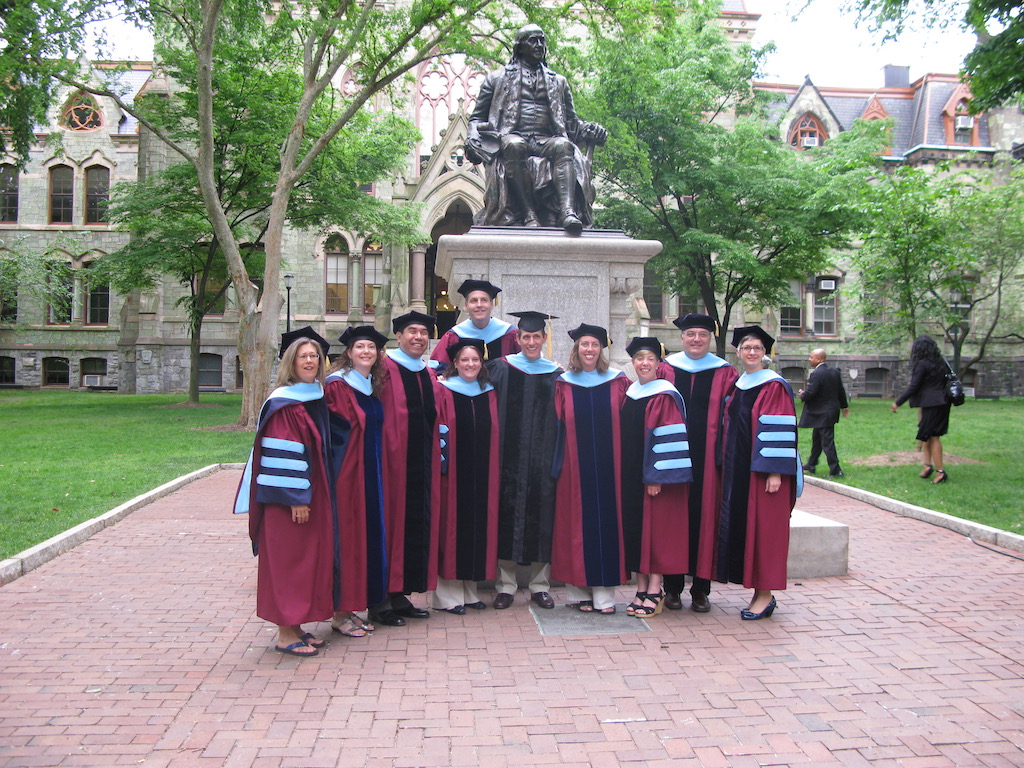I recently attended the 10th reunion of doctoral graduates at the University of Pennsylvania’s Graduate School of Education (Penn GSE). The Executive Doctorate in Higher Education Management program is an Ed.D. program initiated two decades ago at Penn GSE by Professors Robert Zemsky and Marvin Lazerson. Unlike traditional doctoral programs, the Penn GSE program was modeled similar to Wharton’s Executive MBA program, with a cohort of students from around the country and overseas. Each cohort begins the program in August with a week of classes, continuing with a three-day weekend of classes monthly thereafter for two years, with a summer two-week international experience after year one. While students take required courses with no electives, they also research and write a dissertation which they defend after year two.

I am a member of Cohort 8 of the program and, of our group of 22 students, 20 graduated. When we met for the first time on day one of the program, our youngest member was 32 and our oldest, 62. All of us worked at colleges or universities, mostly in the U.S., but one of our members lived and worked in Costa Rica and another in Puerto Rico. The program was transformational for almost all of us in that our careers in higher education had been as administrators, and the goal of the program was to broaden our knowledge of all the major policy and management areas of higher education and to plan, propose, research, write and defend a dissertation on a research topic of our interest.
The pace was brutal. We had to adjust our free time in order to accommodate reading hundreds of pages of assigned articles and writing and submitting 4-6 papers monthly. While 22 months was a grinding pace, it was probably the right amount of time to attract almost two dozen college administrators to a program that would overtake their personal lives for the next two years. We traveled to Penn monthly, attended class, completed individual and group assignments, and dined together.
Approximately 15 years ago, the Penn GSE program director held the first Higher Education Leadership Conference, designed to bring back alums for the program as well as to see classmates and meet alumni from other cohorts. Given at least 45 alumni who have gone on to be college presidents and many more in other senior leadership positions, most of the program’s panelists include alumni or colleagues of alumni. One of the highlights of the annual conference is the awards ceremony for the Robert Zemsky Medal for Innovation in Higher Education, an endowed award honoring him for his contributions to improving higher education. This year’s recipient was Penn President Amy Gutmann, whose 15 years at the helm has transformed the university from “excellence to eminence.” In accepting the medal, she noted, “Unorthodox ideas often inspire people to look at us and say, ‘That’s impossible.’ The next time you embark on an unorthodox educational endeavor that folks call worthy but ‘impossible,’ take it as high praise and find a way to collaborate with a diverse team to make it happen.”
Although it’s been a decade since my cohort and I successfully defended our dissertations, the program continues to influence us. Most of us are still active administrators, and both our intra- and inter-cohort connections as well as our Penn GSE faculty connections provide excellent opportunities to discuss challenges and opportunities in the field. For me, the program was truly transformational and I’m grateful that I was able to participate. While grinding through a doctoral program in two years is not the normal experience, it was very innovative 20 years ago and only a few other schools have attempted to duplicate it since.
The high percentage of alumni who return annually to the Leadership Conference is a testimony to the bond established between cohort members and Penn GSE. The program is a great example of how institutions can make a difference when structure is designed to meet the needs of prospective students. In fact, when APUS evaluated curriculum options for two new doctoral programs, we selected the cohort format as holding the greatest promise for achieving a higher graduation rate. We’re in our third year of the first cohort and, thus far, our students are on track for a higher rate than many of our peer institutions. Penn GSE, I thank you for a great learning experience, and the friendships from so many alumni and faculty. Cheers!











